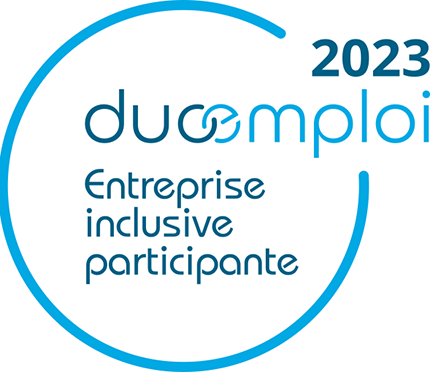
Breadcrumb
- News and Events
- News
- Content
- RI-MUHC participates in the DuoEmploi program
null RI-MUHC participates in the DuoEmploi program
During the Quebec Week for Persons with Disabilities, two people joined research and administrative teams for a daylong internship

SOURCE : RI-MUHC
A recent immigrant to Canada with a PhD in biomedical sciences and pharmacy, Sylvie-Mireille Bambi is looking for opportunities to work in a research lab. A person with a disability, the obstacles she encounters in her search include preconceptions about her capabilities.
This month Sylvie-Mireille Bambi spent a day with the Animal Resources Division (ARD) of the Research Institute of the McGill University Health Centre (RI-MUHC) as part of a program known as DuoEmploi. This provincial government initiative pairs Quebec companies with people with disabilities for one-day internships. Each side learns from the other. Participants can discover a professional environment and potential employer in their region, prepare for professional integration and promote their skills. The organization can discover the participant’s potential and skills, help managers and employees understand diversity and accessibility, and publicize the organization’s values and open positions.
Diego Herrera, specialist in Equity, Diversity and Inclusion (EDI), organized the first DuoEmploi initiative at the RI-MUHC. In addition to the Animal Resources Division, the Human Resources and Environmental and Health and Safety Division (HR and EHS), Research Informatics and IT Division, Infectious Diseases and Immunity in Global Health Program, Translational Research in Respiratory Diseases Program and Centre for Outcomes Research and Evaluation offered to welcome a person with a disability for the one-day internship. DuoEmploi program coordinators were able to match two candidates with RI-MUHC teams in this first year. Their internship day took place on June 5 and 7, within the Quebec Week for Persons with a Disability.
“Our primary goal with this initiative was to learn from people with disabilities, particularly about accessibility issues within our organization. As well, we hoped to raise awareness about the potential and abilities of this group of people who are systematically excluded, and to reflect on ways to attract and integrate them into the kind of work we do,” says Diego Herrera. “We were pleased to find so much interest from our research teams.”
Within the ARD group, Sylvie-Mireille Bambi began her day in a workshop training with other lab members. She then attended an Animal Health Technician roundtable meeting where the group reviewed Standard Operating Procedures. After that, she joined a discussion about maintaining a zebrafish colony and observed some hands-on technical work with laboratory mice.
“We enjoyed our time with Sylvie-Mireille and appreciated exchanging information about her past experiences and knowledge,” says Anna Choy, manager of Veterinary Services in the ARD. “We learned about her preclinical work and the kinds of reports and analyses that she has produced. She brought an important perspective from her PhD experience with clinical trials and antibodies. We were able to relate to the connections and dependencies between academic work, preclinical studies, clinical trials, and final drug approval.”
Each internship ended with a roundtable discussion of learnings on both sides.
“Listening to the person with disability, asking them what they can do is critical for their integration,” said Quinn Leaves, the second DuoEmploi participant at the RI-MUHC, who interned as an administrative assistant on the HR and EHS team. “Give me the opportunity and I will adapt myself according to my abilities.”
Both DuoEmploi interns agreed on the importance of informing a team in advance that a person with disability will work with them. An early conversation about the kinds of accommodations they may need is critical to facilitate integration.
“No one is exactly equal,” said Quinn Leaves. “Show openness in your job posting and during onboarding and you will be able to attract more diverse people.”
“Allowing a person with a disability to express their needs is so important,” added Sylvie-Mireille Bambi.
“Our teams and our organization become stronger when we embrace diversity of all kinds,” said Sonia Rea, director of HR and EHS at the RI-MUHC. “I’m thrilled that we were able to participate in this program. It allows us to better prepare ourselves to attract and retain researchers and personnel representative of the diversity of Canadians. This is one main goal of our EDI Action Plan.”
“There is still a lot of work to do: adapting our spaces, our job postings, and especially our minds,” added Diego Herrera. “Researchers can be more open to the potential that people with disabilities bring to the table. We need to create more opportunities in which people with disabilities feel research and science can be part of their professional lives. We are heading in that direction.”
If your RI-MUHC team is interested in participating in the next DuoEmploi initiative or in other accessibility-related projects, please contact ediPraesent id dolor porta, faucibus eros vel.ri@muhc.mcgill.ca.
June 22, 2023
